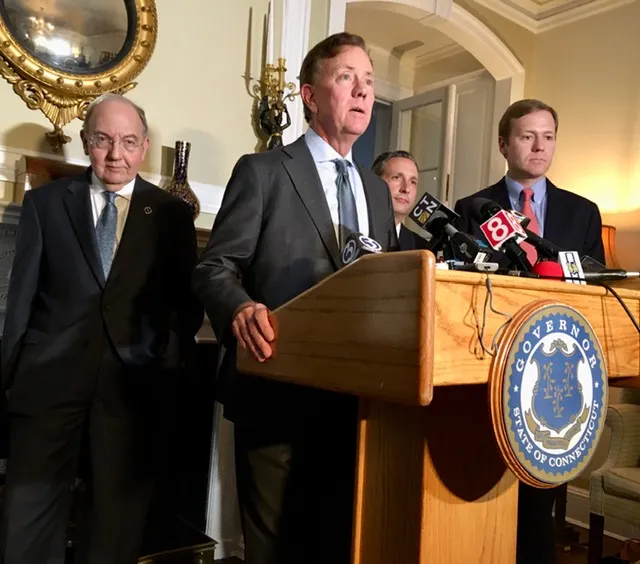Copyright Hartford Courant

Facing federal cuts with wide impacts, the Connecticut legislature plans to create a new, $500 million fund this week. The goal is to cover cutbacks in a variety of key programs. Top officials said lawmakers will be voting on the plan Wednesday and Thursday to ensure there is enough money for food benefits and heating assistance, among others. The money will cover shortfalls in the Supplemental Nutrition Assistance Program, known as SNAP, and Women, Infants and Children, known as WIC. The funds will also go to the Low Income Heating Energy Assistance Program, known as LIHEAP, that will help families in the upcoming winter season. The money can also be used for the broad categories of health care, child care, housing, and school meals, officials said. Since the longest federal government shutdown in American history is continuing despite an agreement in the U.S. Senate, Gov. Ned Lamont said that the state will be closely monitoring how much money is needed to help Connecticut residents. The issue, lawmakers said, has been a roller coaster ride with different court rulings and various statements by President Donald Trump’s administration. “Maybe we’ll know about SNAP by the end of this week and what we can expect from the federal government. Maybe not,” Lamont told reporters at the state Capitol in Hartford. “Maybe we’ll know by the end of this week what we can expect in terms of LIHEAP.” Lamont is being given authority to allocate up to $500 million, but his decisions can be stopped if four of the legislature’s top six leaders in both chambers reject his decisions over the next three months. The full legislature is not expected to vote on any spending decisions until the 2026 regular session starts in early February. Lawmakers said it would be difficult to hold special sessions during the Thanksgiving, Christmas, and New Year’s holidays as many lawmakers will be traveling out of state. A similar arrangement was established during the coronavirus pandemic when the leaders were given additional authority because the General Assembly could not be called into special session on short notice. House Republican leader Vincent Candelora of North Branford helped craft the bipartisan plan but says the money must be spent wisely. “There’s a leap of faith here,” Candelora told reporters after Monday’s news conference. “We are putting $500 million into the hands of the governor to mitigate this crisis, and we need to make sure he is doing just that. … If the federal government reopens, I certainly can understand why Republicans will say this fund is no longer necessary — that government has reopened.” The food recipients, under SNAP, have already had their money replenished on their electronic benefit cards through state funds. Those cards are swiped at supermarkets like debit cards since the federal government no longer issues actual food stamps. “The money is already there for November,” Candelora said of the SNAP money on the cards. “Now, we’re looking at making sure the money is there in December.” Under the law, the state budget surplus money would normally be used to pay down pension debt as the state has set aside $8.5 billion since 2021 in additional supplemental funds into the pension funds for state employees and public school teachers. The total is expected to increase to $10 billion by the end of the fiscal year. The $500 million fund will be set aside in the state rainy day fund for fiscal emergencies, which would increase from the current $4.3 billion to $4.8 billion. In essence, lawmakers will be raising the state’s rainy day fund equivalent to 23% of the general fund, which is up from the current maximum of 18%, officials said. Senate President Pro Tempore Martin Looney, a New Haven Democrat, said the federal government has created only bad options that constitute “a Sophie’s Choice dilemma,” referring to the novel by William Styron and the movie with actress Meryl Streep, that represent “a terrible and heartless position for a national government to take regarding its own people.” House Speaker Matt Ritter of Hartford — a key player in the negotiations — said the deal could not have been reached without the help of Looney and Candelora. He said that 91 votes are needed in the state House of Representatives to create the fund, and he said that 110 lawmakers might vote for the measure. One of the few top leaders who did not attend the news conference, Senate Republican leader Stephen Harding of Brookfield, raised concerns about the new special fund. He said that he had not seen the final language of the legislation, adding that the federal government might reopen as early as Thursday, the date when the state Senate is scheduled to vote. A $13 million bid is in to purchase Prospect Medical Holdings’ Waterbury Hospital. UConn wants it. “We may not need to take this step to give Gov. Lamont a huge amount of power to control a half a billion taxpayer dollars,” Harding said Monday. “We don’t need to be creating gigantic potential ‘slush funds’ in our already unaffordable state.” State Sen. Jorge Cabrera of Hamden is seeking the end of the federal government shutdown, but is asking Democrats to preserve the key subsidies for Obamacare under the national Affordable Care Act. Both U.S. Sens. Richard Blumenthal and Chris Murphy voted Sunday against ending the shutdown as they called for a continuance of the health care tax credits. “I’ve got 5,500 people in my Senate district on Access Health CT, and 1,800 of them will lose their entire federal tax credit and see their monthly insurance premiums increase if this Republican budget is approved as written,” Cabrera said. “I’m urging all Democratic members of Congress to stand firm with the people of America and don’t be bullied or blackmailed into hurting your own constituents.” Lamont said the easiest resolution to the problems would be to quickly end the federal government shutdown and get back to normal in Washington, D.C., which has not been the case recently. “Washington, please get your act together to make a deal,” Lamont said. Lt. Gov. Susan Bysiewicz agreed, noting that 350,000 people rely on SNAP, representing about 10% of all Connecticut residents. “It’s been very scary to go to food banks around the state,” Bysiewicz said, “and see empty shelves.” Christopher Keating can be reached at ckeating@courant.com



